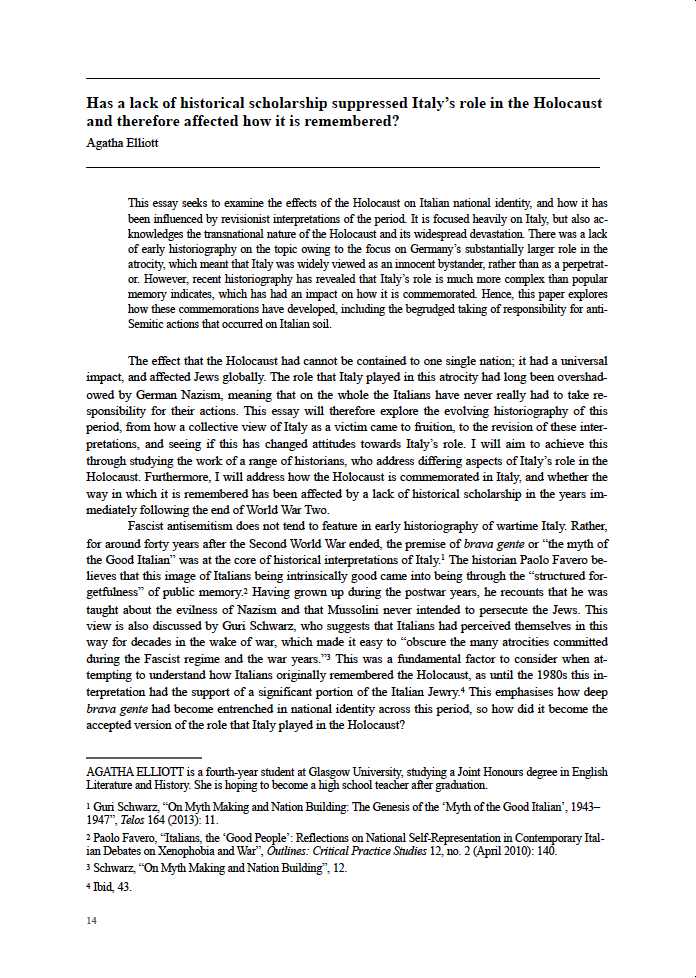Has a lack of historical scholarship suppressed Italy’s role in the Holocaust and therefore affected how it is remembered?
DOI:
https://doi.org/10.36399/GroundingsUG.11.170Keywords:
Historiography, Holocaust, Shoah, Italy, National Identity, Holocaust RemembranceAbstract
This essay seeks to examine the effects of the Holocaust on Italian national identity, and how it has been influenced by revisionist interpretations of the period. It is focused heavily on Italy, but also acknowledges the transnational nature of the Holocaust and its widespread devastation. There was a lack of early historiography on the topic owing to the focus on Germany’s substantially larger role in the atrocity, which meant that Italy was widely viewed as an innocent bystander, rather than as a perpetrator. However, recent historiography has revealed that Italy’s role is much more complex than popular memory indicates, which has had an impact on how it is commemorated. Hence, this paper explores how these commemorations have developed, including the begrudged taking of responsibility for anti-Semitic actions that occurred on Italian soil.
References
Clifford, Rebecca. Commemorating the Holocaust: The Dilemma of Remembrance in France and Italy. Oxford: Oxford University Press, 2013.
Favero, Paolo. “Italians, the ‘Good People’: Reflections on National Self-Representation in Contemporary Italian Debates on Xenophobia and War.” Outlines: Critical Practice Studies 12, no. 2 (April 2010): 138–153. http://ojs.statsbiblioteket.dk/index.php/outlines/article/view/2370/3367.
Gordon, Robert S. C. “The Holocaust in Italian Collective Memory: Il giorno della memoria, 27 January 2001.” Modern Italy 11, no. 2 (2006): 167–188.
Gordon, Robert S. C. The Holocaust in Italian Culture, 1944–2010. Stanford, California: Stanford University Press, 2012.
Knittel, Susanne C. The Historical Uncanny: Disability, Ethnicity, and the Politics of Holocaust Memory. New York: Fordham University Press, 2014. https://muse.jhu.edu/book/35563.
Sarfatti, Michele. The Jews in Mussolini’s Italy: From Equality to Persecution. Madison: University of Wisconsin Press, 2006.
Schwarz, Guri. “On Myth Making and Nation Building: The Genesis of the ‘Myth of the Good Italian,’ 1943–1947.” Telos 164 (2013): 11–43. http://journal.telospress.com.simsrad.net.ocs.mq.e-du.au/content/2013/164/11.full.pdf+html.
Segre, Dan Vittorio. Memoirs of a Fortunate Jew. Bethesda, Md.: Adler & Adler, 1987.
Steinberg, Jonathan. All or Nothing: The Axis and the Holocaust 1941–43. London: Routledge, 1990.
Stille, Alexander. Benevolence and Betrayal: Five Italian Jewish Families Under Fascism. New York: Summit Books, 1991.
Ventresca, Robert. “Mussolini’s Ghost: Italy’s Duce in History and Memory.” History & Memory 18, no. 1 (2006): 86–119. Project MUSE.
Zimmerman, Joshua D. “Introduction”, in Jews in Italy under Fascist and Nazi rule, 1922–1945, edited by Joshua D. Zimmerman. Cambridge: Cambridge University Press, 2005. http://assets.-cambridge.org/052184/1011/excerpt/0521841011_excerpt.htm.
Zuccotti, Susan. The Italians and the Holocaust: Persecution, Rescue and Survival. New York: Basic Books, 1987.

Downloads
Published
Issue
Section
License
Copyright (c) 2018 Agatha Elliott

This work is licensed under a Creative Commons Attribution 4.0 International License.
The CC BY 4.0 license is a Creative Commons license. This is a non-copyleft free license that is good for art and entertainment works, and educational works. It is compatible with all versions of the GNU GPL; however, like all CC licenses, it should not be used on software. People are free to: Share — copy and redistribute the material in any medium or format; Adapt — remix, transform, and build upon the material for any purpose, even commercially. The licensor cannot revoke these freedoms as long as you follow the license terms. But they must conform to the following terms: Attribution — You must give appropriate credit, provide a link to the license, and indicate if changes were made. You may do so in any reasonable manner, but not in any way that suggests the licensor endorses you or your use. No additional restrictions — You may not apply legal terms or technological measures that legally restrict others from doing anything the license permits.
Please check individual article PDF copies to see if any additional restrictions apply.







